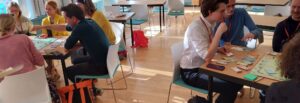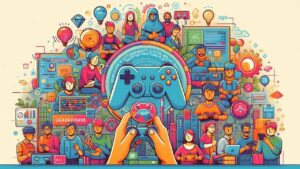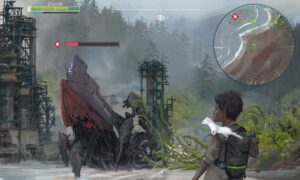Utrecht Game Lab
With the Utrecht Game Lab, we understand game-making as a form of rhetoric, of participating in public discourse through the ‘language of games’, and co-designing existing games and game franchises as a form of ‘response’ to the ideas and ideologies put forth in commercial games, official expansions or grassroots modifications (‘mods’).
To continue to the website, click ‘here’.
To sign up for the mailing list and receive email updates, click ‘here’.
To access the UGL Etherpad with more information about the next meeting, click ‘here’.

Hybrid Franchise Hacking Workshop (Gamelab x Man Met)
On April 30th 2025, the Utrecht Gamelab and the Manchester Game Centre at Manchester Metropolitan University collaborated on a first-of-its-kind hybrid three-hour co-design workshop, building on the work of Chloe Germaine and Paul Wake on ‘game hacking’ and the ‘franchise hacking’ technique developed by the Utrecht Game Lab on the basis of Germaine and Wake’s

Franchise Hacking Workshop (Gamelab x WUR Games Hub)
The workshop is part of the ongoing USO project Crisis to Resilience (2024-2027), which develops and evaluates techniques based on creative practices like game-making and community gardening/biophilia to foster resilience counter climate anxiety as well as other negative climate emotions. The workflow used in this workshop is built on top of free and accessible tools

Redesigning Monopoly to Foster Climate Resilience
On March 6th, 2025, as part of the annual Onderwijsfestival at Utrecht University, Flora Roberts, Larike Bronkhorst and Stefan Werning organized a workshop on how co-designing iconic (board) games like Monopoly can facilitate imagining sustainable futures and help mitigate negative and cultivate positive climate emotions.

Game Research @Dutch DiGRA 2024 Symposium
On November 21, game scholars from all over The Netherlands and well beyond gathered at Erasmus University for the Dutch DiGRA 2024 Symposium. Many researchers from Utrecht presented their projects.

Ecogame Playtesting Series 2024/25
In September 2024, the Network for Environmental Humanities (NEH) and the Utrecht Game Lab are launching a new series of events playtesting and discussing ‘ecogames’: or games that engage with the environment and with the climate crisis.

“Hacking Board Games” Workshop at RMeS 2024 Summer School
Concluding the RMeS Summer School 2024: Environmental Media, Laura op de Beke and Stefan Werning of the Utrecht Game Lab organised a workshop for RMA students to facilitate ecological thinking by redesigning (or: ‘hacking’) board games.

Franchise Hacking – Magic: the Gathering
'Franchise hacking’ within Magic: The Gathering (MtG) means to creatively alter game elements to embed urgent real-world ecological narratives into the game’s design.

Week of the Game @ Utrecht University
Here is the full up to date programme overview for Utrecht University's Week of the Game 2024.

Spationomy 2.0- An Application of Discursive Game Design
In a time where it is difficult to engage with the increasingly fraught world around us, games scholars are continuing to search for new ways to approach difficult topics. One such example, is the application of Discursive Game Design(DGD) as seen in the Carbon Pearl game produced in 2021.

Taking Playful Scholarship Seriously: Discursive Game Design as a Means of Tackling Intractable Controversies
The article at hand explores the concept of playful scholarship, focusing specifically on the use of playfulness in re-assessing the collaboration between academia and societal partners to tackle “intractable policy controversies” (Schön and Rein 1994, p. 23)—i.e., challenges in which opposing parties operate with conflicting frames (often without even noticing).
